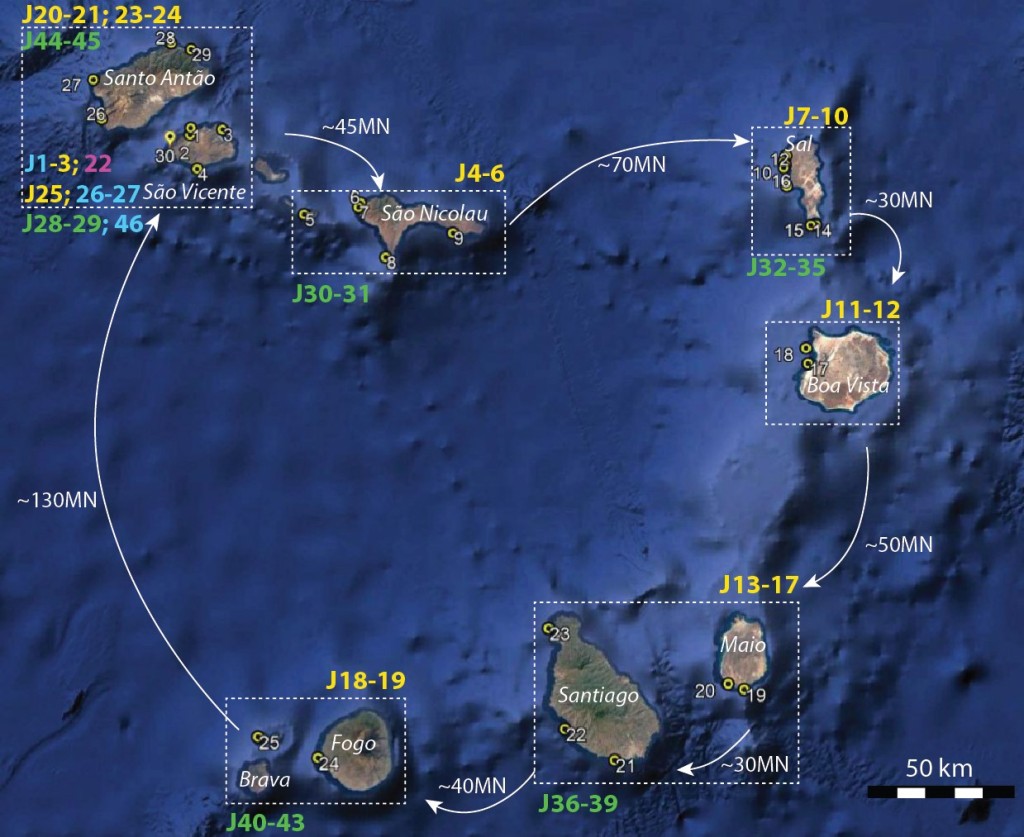
DIverSity, Endemism and Evolutionary Patterns of the marine benthic fauna in CabO VERde
See references related to DISCOVER here

DISCOVER is a project linked with a scientific campaign which was funded by the Commission Nationale de la Flotte Côtière. It took place between the 9th of july and the 23rd of August 2022, onboard R/V ANTEA (IRD). The scientific campaign DISCOVER has brought together 18 scientists from 13 international institutions : IRD (France), CNRS (France), IFREMER (France), University Aix Marseille 2 (France), Universidade Técnica do Atlântico – UTA (Cabo Verde), Instituto do Mar -IMAR (Cabo Verde) , Universidade Federal do Rio de Janeiro (Brasil), Leibniz-Institut zur Analyse des Biodiversitätswandels (LIB), Museum of Nature, Hamburg (Germany), Museu Nacional Universidade Federal do Rio de Janeiro (Brasil), Universidad de las Palmas de Gran Canaria (Spain), King Abdullah University of Science and Technology – KAUST (Kingdom of Saudi Arabia), Center for Marine Biology University of São Paulo (Brasil), and California Academy of Sciences (USA).

Media: in portuguese, at RTC multimédia, and local TV: RTC – Rádio Televisão Cabo-verdiana; in french and portuguese interview at local radio Rádio Morabeza
In our changing world facing threats related to global change, preserving marine biodiversity is becoming a priority. Yet, we can only protect what we know, and a large part of this marine biodiversity remains unknown. One reason for this is that some regions of the world and/or particular ecosystems remain less studies that others. This is the case of peripheral regions which are nevertheless viewed as “evolutionary incubators”. Isolated islands are expected to have reduced species richness but high levels of endemism, as a result of few colonization events. In these oceanic islands, peripheral endemism is mainly driven by geographic isolation, leading to allopatric speciation induced by vicariance. But selection may act in combination with geographic isolation, which is likely the case in Cabo Verde archipelago. In fact, this archipelago has been identified as one of the 18 richest multitaxon centers of endemism of tropical reef biodiversity and one of the top ten priority locations worldwide for the conservation of reef habitats. Recent genetic work conducted on several taxonomic groups revealed high numbers of undescribed and/or cryptic species, but evolutionary processes that have contributed to the enrichment of the Cabo Verde fauna are not fully understood.
In this context, the overall goal of this project is to generate new data regarding species richness, endemism, and phylogeographical patterns for overlooked benthic groups in overlooked ecosystems. This, added to already published data available in public databases, will provide a solid multitaxonomic dataset to infer the evolutionary history of the Cabo Verde reef fauna. We will infer main colonization pathways (based on their relationship with Brazilian, Caribbean and Mediterranean provinces) and further explore the processes that have contributed to the diversification of this marine benthic fauna through time and space. To reach this goal, we have built an international collaborative network of scientists with strong expertise in different taxonomic groups and analytic approaches. In this project, we will first focus on sponges, cnidarians (including soft corals, gorgonians, hydrozoans), ascidians and crustaceans (Mysida and Decapoda) from semi-dark and dark habitats (such as underwater caves) and mesophotic reefs (from 40m to 100m depth). We have organized this oceanographic research cruise in 2 legs according to these types of habitats. During the scientific cruise, samples will be collected underwater using SCUBA diving and will further be identified through an integrative taxonomy approach, i.e. combining different characters (morphology, genetics, genomics and metabolomics). With this integrated approach, we aim at counteracting issues that traditionally lead to bias the estimation of biodiversity during underwater assessments, and by choosing Cabo Verde as a studying location, we intend to demonstrate that understudied biogeographical provinces can provide insights into evolutionary processes shaping species diversity of entire taxonomic groups.
The campaign
Took place in summer 2022… more soon!!!!!
